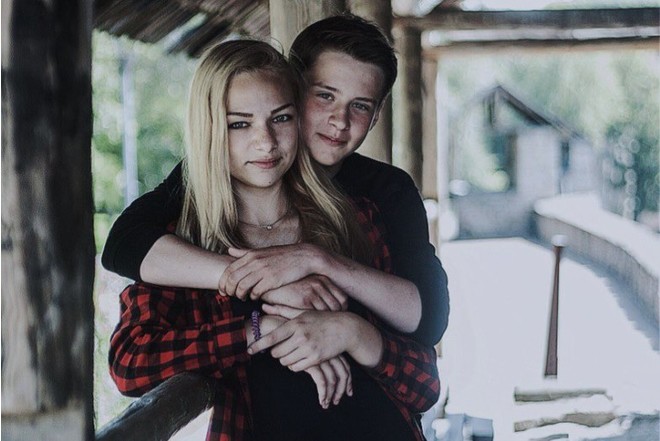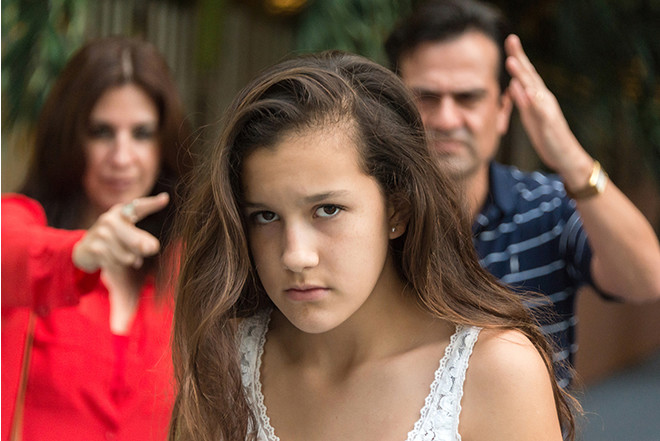"I loved you, but you yourself did not notice howdestroyed my psyche and life. Farewell to all - and friends, and family, and acquaintances. Do not worry, I will leave beautifully. Good luck to all in your life and, please, do not be afraid to live as you want or think necessary. Life for your own pleasure is the best life. I love you. "This text - a suicide note, which left Pskov Bonnie and Clyde on their pages in social networks. Both have the same text. Both records in social networks are permeated with a desperate sense of uselessness ... Having broken into the house where the children barricaded themselves, the police found them dead. Denis and Katya were 15 years old. Why is this happening, because of what children go to such a terrible protest, Woman's Day. And what to do to protect the child, says psychotherapist Tatyana Ogneva-Salvoni. Photo: social networks
Photo: social networks
1. Do not shift your powerlessness to the child
A child at this age needs to have everything explained to him.Usually, the concepts of what is good and what is bad are laid before the age of 10. But if parents failed to set boundaries at the time, then in adolescence they are faced with the first fruits of their upbringing. And here it is important that the parent does not shift responsibility to the child. When they shout and hit, this happens from helplessness, from the unwillingness to understand their own guilt. You need to admit to yourself: this is your, the parent's "screw-up". And there is nothing terrible in telling the teenager frankly: like, you know, I'm sorry that I was unable to convey to you what is good and what is bad, what is good and what is evil. Children at this age feel sincerity very well, and you need to talk to them from the heart. You can say something like: I understand that now you are almost an adult, you have your own opinion, but I will tell you that it hurts me (sadly, unpleasantly, etc.) if you do this and that. It upsets me when you behave in such and such a way.
2. Talk about your feelings
Show that you are not a robot, not ideal, notsomeone unattainable, but also a living person. And, therefore, other people are also alive, with their own feelings. By talking about their feelings, a parent shows strength and wisdom. Photo: GettyImages
Photo: GettyImages
3. Learn to hear the feelings of your child
And here you need to become a bit of a psychotherapist forhim. Ask leading questions, do not judge, do not lecture, do not educate. And with the help of simple leading questions “What happened? What do you feel? Why do you need this? What is behind this? What is the benefit/advantage/meaning of this? What would you call it, what is good about it? What does it give you” and so on, you can get to the bottom of why the child goes to some extreme measure, what he wants to achieve by violating the laws of society. The main thing in this case is to withstand his negative feelings and claims. Agree with them: like, these are your feelings, yes, you have the right to them. And I also got angry/offended/outraged at one time ... You can talk about a similar experience from your adolescence. Just so as not to lose contact with your child. Just so you can talk. A calm conversation, in which the goal is to understand what is happening in the soul, in the life of the child, is more effective than any punishment.
4. To be ready to see its shortcomings in it
To the fact that in the child it will be reflected threefoldsomething that you close yourself off from, something you don’t want to see in yourself. For example, one mother suppressed depression with suicidal thoughts, hid it deeply from herself, didn’t want to understand it, and switched to some positive all the time. At the age of 13, her daughter began to wear only black clothes, openly say out loud what her mother hid from herself. The mother couldn’t stand it, she broke out into scandals, which only intensified the destructive processes in the family and affected everyone around her. It almost came to tragedy until the mother admitted to herself that she wanted to jump out of the window, and her daughter seemed to read this hidden desire. She went to therapy, dealt with her neurosis, with what was poisoning her inner life. And the daughter stopped “playing” depression and suicide. Photo: GettyImages
Photo: GettyImages
5. To say that the child is not right
This is necessary, but it is important to approach it correctly.Otherwise, you can convince him of his own wrongness so much that he will then consider himself wrong in everything for the rest of his life, refuse the joys of life, punish himself, and so on. Here it is important to divide guilt, rightness, and responsibilities into two. Like, I am wrong that I yelled at you/did not explain/did not protect you (that is, admit some real guilt before the child), and you are wrong that you did this and that. But I am your father/mother, and I have a duty to teach you the rules of life, I must tell you this and that. And you, as my child, must listen to me. And preferably obey.
6. Be sure to try to find something good in the situation
It is very important to find something good for yourself andfor a child. You know, it taught me this and that. What did it teach you? I realized this and that, I now understand that... And what did you realize, and what do you understand? You need to praise him for something, end on something positive that will say that you still value him, that you see not only his mistakes, but also his merits, his virtues.









